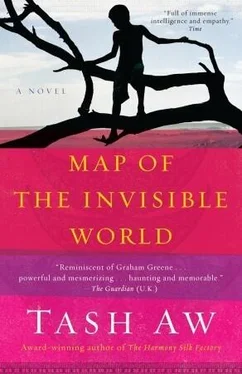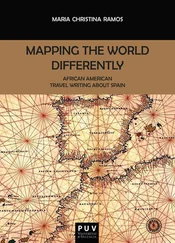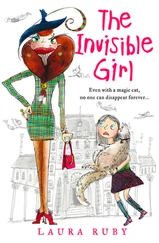Tash Aw - Map of the Invisible World
Здесь есть возможность читать онлайн «Tash Aw - Map of the Invisible World» — ознакомительный отрывок электронной книги совершенно бесплатно, а после прочтения отрывка купить полную версию. В некоторых случаях можно слушать аудио, скачать через торрент в формате fb2 и присутствует краткое содержание. Год выпуска: 2010, Издательство: Spiegel & Grau, Жанр: Современная проза, на английском языке. Описание произведения, (предисловие) а так же отзывы посетителей доступны на портале библиотеки ЛибКат.
- Название:Map of the Invisible World
- Автор:
- Издательство:Spiegel & Grau
- Жанр:
- Год:2010
- ISBN:нет данных
- Рейтинг книги:4 / 5. Голосов: 1
-
Избранное:Добавить в избранное
- Отзывы:
-
Ваша оценка:
- 80
- 1
- 2
- 3
- 4
- 5
Map of the Invisible World: краткое содержание, описание и аннотация
Предлагаем к чтению аннотацию, описание, краткое содержание или предисловие (зависит от того, что написал сам автор книги «Map of the Invisible World»). Если вы не нашли необходимую информацию о книге — напишите в комментариях, мы постараемся отыскать её.
comes an enthralling novel that evokes an exotic yet turbulent place and time—1960s Indonesia during President Sukarno’s drive to purge the country of its colonial past. A page-turning story,
follows the journeys of two brothers and an American woman who are indelibly marked by the past — and swept up in the tides of history.
Map of the Invisible World — читать онлайн ознакомительный отрывок
Ниже представлен текст книги, разбитый по страницам. Система сохранения места последней прочитанной страницы, позволяет с удобством читать онлайн бесплатно книгу «Map of the Invisible World», без необходимости каждый раз заново искать на чём Вы остановились. Поставьте закладку, и сможете в любой момент перейти на страницу, на которой закончили чтение.
Интервал:
Закладка:
“So, what were you doing at the party, Adam?” Z asked. “I thought you didn’t know anyone in Jakarta.”
Adam’s limbs suddenly felt lifeless, as if he could not control them. He wanted to lift his hand to wipe his brow but he did not have the strength; he could not even feel where his fingers were. His ribs were very painful again; he had forgotten about them, but now they were hurting. They were hurting badly and he wanted to throw up. He nodded. That was all he could do.
“Adam,” Z said, lowering her voice. She cast a nervous look at the driver and leaned toward him. “You’re in trouble, aren’t you? What is it? You can tell me. Listen to me, Adam. Are you okay?”
He nodded again. He felt the sweat trickle down his temple, following the line of his jawbone before falling onto his neck. He was glad he was in the car and not out there, out in the city.
The Cadillac eased its way onto the road and joined the barely moving traffic. Through the tinted windows they saw more soldiers on the street. A group of them were surrounding a man on his knees; like the janitor, he had his hands on top of his head. A soldier reached into the man’s shirt pocket and pulled out a pack of cigarettes. He tossed them toward his friends and smacked the man on the head, a heavy blow with an open palm which made the man tumble forward, his hands reaching out to break his fall. He picked himself up and returned obediently to his previous position, kneeling, hands on his head — like one of those children’s toys that twists into a hundred different shapes but always folds back into the same position. And although the man had his head bowed, both Adam and Z could see that it was Din.
Z looked at Adam. Her eyes were calm and she did not say anything for a while.
“Are we heading home, Miss Zubaidah?” the driver asked.
Z nodded. “Quickly. Please.” She did not stop looking at Adam. She said, “You’re coming home with me.”
23
W hen she could no longer bear life in Ithaca, New York, Margaret left for Europe, as she’d always known she would. It was an unfussy departure, announced calmly and executed without drama or emotion. She had gone to the campus to tell her mother the news. It was early in the fall; a new crop of students, wide-eyed and gullible, were gathered in her mother’s book-strewn office, listening enthralled as she held aloft a ritual circumcision stick from New Guinea. Margaret coughed to indicate her presence, and then simply told her mother that she had booked her passage to Europe — to Paris. Her mother did not reply for quite some time; she simply regarded Margaret with a look of confusion and annoyance, the long spearlike stick held aloft in her right hand like an oversized conductor’s baton. Margaret felt quite proud of herself. It was just the kind of thing her mother would have done; she had out-mothered her mother.
“When are you going?”
“Next week,” Margaret replied in a tone of voice that suggested mild irritation, as if it were obvious what the answer would be.
It took her mother a good few seconds to regain her composure. “Well,” she said, finally, “that sounds like fun! Don’t be too dissolute, will you — you know what those Parisians are like.” She waved the stick as though cracking a whip or a riding crop; the students chuckled.
Outside, the trees had turned the landscape into a patchwork of gold and rust. The leaves were beginning to fall, spiraling gently to the ground like the first flakes of snow at the start of a heavy snowstorm, slowly, as if they would never reach the earth. Margaret went home and told her father she was leaving and that she did not know how long she would be away. He had been studying sheets of tiny photographs through a magnifying glass; he looked up and said, “Come back soon. Please.” Then he went back to his photographs and did not look at her again.
The journey on the Île de France was quicker and duller than she had imagined. Her second-class cabin was simple, small but not at all cramped, shared with an aged woman who nodded pleasantly at Margaret but otherwise showed no desire to converse, which suited Margaret perfectly. It was here that Margaret remained for most of the crossing, staying away from the rich young Americans for whom she was already developing a distaste. They roamed the decks calling after each other in high-spirited voices, arranging rendezvous in the first-class dining room or tumbling noisily into their expensive cabins. The men were strong-boned and floppy-haired, the women sophisticated, almost world-weary, even at that age. Margaret thought she recognized two of them from Cornell; she could not remember their names but knew that she did not wish to speak to them. The farther she traveled from New York, the more justified she felt in disliking them; slipping away from the landmass of America, she no longer had reason to pretend to be one of them.
On the train from Le Havre to Paris she read the headlines on someone else’s newspaper. LA CHINE DEVIENT COMMUNISTE, it shrieked in big bold letters: MAO PROCLAME LA RÉPUBLIQUE POPULAIRE DE CHINE. A much smaller picture caught her eye, and she tried to follow the pages as they turned — a fuzzy image of a man of darker complexion than a Chinese; Javanese, surely, or perhaps Malay. She waited for the reader to return to that page, but the picture was gone, and she could see only VIÊT MINH REFUSES TO RECOGNIZE PROCLAMATION OF INDEPENDENCE. There was a picture of the emperor Bao Dai, newly installed as head of state, but the Javanese man had disappeared. Maybe she had just imagined him.
When she reached Paris she felt she already knew the place. She remembered all the things that Karl had told her about the city, about himself. Every time she walked on a cobblestoned street she half-hoped to look up and see him walking toward her, collar turned up against the growing October chill, tripping occasionally on the uneven surface (he’d never learned to lift his feet). Or she would look in the window of a bookshop near the Sorbonne and imagine him hurrying away holding a new box of pencils. Sometimes she would pass someone and catch a whiff of cologne, and she would turn as though she knew him. It was the same scent she remembered on Karl: fresh, grassy, familiar.
She went to look at the place where he had lived, a narrow street of tall, white houses that did not seem to catch much sun. She found the address and stood outside the house for a while, wondering what she was doing there. Don’t be silly, Margaret Bates, she said aloud to her self, he isn’t here. She even smiled at her own stupidity and wondered if one day in the future she would look back and be embarrassed at how ridiculous she had been. And yet she remained standing there for a while, looking up at the windows, trying to remember which one of them Karl would have stood at. At the end of the street there was a pretty iron gate that led into the Luxembourg Gardens. She strolled along the gravel paths, under the drooping branches of lime trees that were shedding their leaves in the wind. She spent many afternoons walking in these gardens, not knowing what to do next.
She went to a grand brasserie in Montparnasse that Karl had once told her about. She loved the shiny brass railings and plush red furnishings, but she did not love the elegantly bored waiters and the immaculately dressed men who looked up at her with a mixture of surprise and suspicion. “Vous êtes seule, madame?” the man at the door asked. She hated the way he said “madame” with an almost imperceptible stress on the first syllable; the overformal politeness made her feel unwelcome, and old. She was only twenty-seven — still very much a mademoiselle . She held her menu upright so that it hid her from the stares of the respectable men around her. Her clothes felt shapeless and dull and slightly soiled, and under the table her shoes seemed clunky and enormous. She spent a long time looking at the menu because it comforted her to have it in front of her — a shield behind which she remained safely anonymous. She thought she would have something elegant, a sole meunière, maybe; but when the waiter came to take her order she suddenly thought: No, I am not going to have a delicate piece of fish, I am going to have something big and smelly and disgusting. She put down the menu and said, “Andouillette. I will take the Andouillette.” She had never had it before but she knew it was pig’s intestines, rolled up into a squat sausage, perfectly revolting. She smiled and sat with her coat on, her chin lifted to meet the gaze of anyone who stared at her. When her food arrived it was worse than she had imagined — a length of pun gent meat covered in charred scabs. She cut off a big piece of it and tried to swallow it whole, like an oyster, but found herself gagging; she lifted her napkin to her mouth and coughed to hide her discomfort, starting to chew furiously until the moment of danger had passed. You are going to finish this, Margaret Bates, she thought to herself, you are going to finish every last bit of this. With each acrid mouthful she felt more resilient. She took a big gulp of red wine, which she didn’t really like either, but it took away the taste of the intestines; before long she had finished a whole carafe and ordered another. It wasn’t so difficult; she could do this. She looked at the other diners with a half smirk, challenging them to disapprove, but they looked away; only one man with a thick mustache smiled back, almost encouragingly. For dessert she had tartetatin and two cups of coffee, which dulled the sharp taste that lingered in her mouth. She paid the bill and left a generous tip that she could not really afford. She enjoyed watching the waiter nod in grudging acknowledgment as he came to collect the silver tray, for somehow it made her feel strong and even a bit wicked, especially when she thanked him with a flourish. He inclined his head slightly and avoided her steady gaze, and that too made her want to smile.
Читать дальшеИнтервал:
Закладка:
Похожие книги на «Map of the Invisible World»
Представляем Вашему вниманию похожие книги на «Map of the Invisible World» списком для выбора. Мы отобрали схожую по названию и смыслу литературу в надежде предоставить читателям больше вариантов отыскать новые, интересные, ещё непрочитанные произведения.
Обсуждение, отзывы о книге «Map of the Invisible World» и просто собственные мнения читателей. Оставьте ваши комментарии, напишите, что Вы думаете о произведении, его смысле или главных героях. Укажите что конкретно понравилось, а что нет, и почему Вы так считаете.












